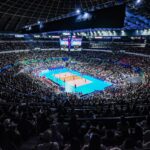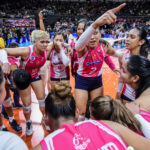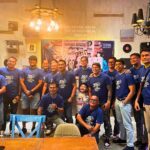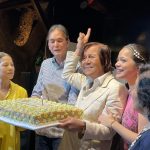On November 21, 1985, Ginebra import Michael Hackett became the first PBA player to score more than 100 points in an official game. Playing against the Great Taste Coffeemakers in Game 1 of their best-of-five series for third place in the Reinforced Conference, Hackett pumped in 103 points to lead the Gins to a 197-168 rout over Great Taste.
The Rivalry takes a look back at the amazing feat made by “The Mighty Bucket” 37 years ago this week.
Prelude
The year 1985 is regarded in PBA history as one of the most significant seasons, the start of its most glorious run that spawned two decades. The league initially struggled after seeing powerhouses Toyota disband the previous year and Crispa prior to the start of the season.
Through the exceptional leadership of President Carlos “Honeyboy” Palanca, III, the stern, authoritative approach of Commissioner Mariano Yenko and the more active role in day-to-day operations by Deputy Commissioner Tommy Manotoc, the PBA saw itself growing by leaps and bounds.
One factor was the apparent parity that Manotoc conscientiously worked on to ensure that not one or two teams will dominate the league. When Crispa disbanded and Shell bought the franchise, he didn’t allow all Crispa players to stay at Shell, and instead, distributed them to other teams. Atoy Co, Yoyoy Villamin and Fritz Gaston went to Manila Beer, Abet Guidaben, Freddie Hubalde and Padim Israel joined Tanduay, Philip Cezar, Bernie Fabiosa Jimmy Javier and Bay Cristobal stayed with Shell while Willie Pearson took his wares to Great Taste. Lim Eng Beng was the 12th player and retired at the end of the 1984 season only to be reinstated in 1986 by Manila Beer.
Similarly, Bogs Adornado was close to signing up with Ginebra San Miguel to join forces with 1973 RP Team teammates Robert Jaworski and Francis Arnaiz, but Manotoc prevented the deal from being consummated. Instead, the sweet-shooting Adornado joined new team Shell.
It was no surprise therefore that all six teams were equally capable of winning a PBA title, making the games close and more exciting, the fans’ support spreading out to all the teams, and the games becoming extremely unpredictable.
The animosity between former Toyota teammates Robert Jaworski and Ramon Fernandez remained at a high, triggering a rivalry initially between Jaworski’s Ginebra and Fernandez’s Manila Beer, then later, Tanduay, after he was traded to the Elizalde franchise for Guidaben.
The league also benefited with the NCC national team returning for another two-conference stint that year. The nationals were in the homestretch of their preparation for the 1985 ABC to be held at Kuala Lumpur. Learning from their experience the previous season, Coach Ron Jacobs’ charges were primed to figure prominently for the championship.
Then, there was the implementation for the first time of the no harm, no foul rule, a concept authored by Manotoc where fouls that won’t impede the movement of a player or force him to miss a shot won’t be called. Manotoc spoke eloquently on this, “A referee can defang a team, render it helpless, demoralize it by calling fouls needlessly, and then hide behind the immunity of judgement calls.” In Manotoc’s own definition of the no harm, no foul rule, “Unless personal contacts are such that they hinder the natural flow of the game, the game must go on unmolested.”
Great Taste rode high in the first two conferences, winning both championships as Ricardo Brown proved to be everyone’s nightmare. The Quick Brown Fox averaged 27.9 points in 65 games to win the Most Valuable Player award practically unchallenged.
The Reinforced Conference
The Coffeemakers were deadset on winning the grand slam. With the conference format allowing for one import with a height ceiling of 6’6, they brought in 6’5 Wally Rank, a fifth-round pick by the San Diego Clippers in the 1980 NBA draft. Rank, though, only got to play four games before being replaced by Michael Britt. Britt didn’t impress Coach Baby Dalupan, and was eventually replaced by Corey Blackwell, who played for the Seattle Supersonics.
Magnolia opted for balik-import Norman Black who powered the franchise to its second PBA title in the 1982 Invitationals. Manila Beer picked Francois Wise, who previously played for U/Tex in 1981 and 1982 and Tanduay in 1983. Shell paraded NBA veteran Howard Carter, who was later replaced by Lester Rowe of West Virginia.
NCC brought in the team that would represent the country in the upcoming 1985 ABC tournament. Since Chip Engelland was not yet eligible to play in the ABC, Coach Jacobs opted to sit him out for the Reinforced. Instead, he had Dennis Still and Jeff Moore leading the nationals.
Tanduay suited up former CBA MVP winner and Denver Nugget Ron Valentine. Ginebra paraded Michael Hackett, a beefy 6’5 who played ferociously inside the paint. The poker-faced, barrel-chested Hackett, a third-round draftee by the Los Angeles Lakers in the 1982 draft (67th overall) who had an uncanny resemblance with actor Gary Coleman of the hit TV comedy series Diff’rent Strokes, may have possessed a cherubic face but was a demon off the boards.
- Spiking popularity: Comparing volleyball’s following in the Philippines and the US

- Cool sweep: How Creamline’s winning formula led to a 7th PVL crown

- Pampanga Dragons celebrate 25th anniversary of MBA championship

- NBA app launches personalization features, live game experience

- Dante Silverio celebrates 86th birthday in style

Format
With seven teams competing, the double round robin eliminations meant each team would play at least 12 games. The top two teams after the eliminations would automatically get semifinal seats while the cellar dweller would be eliminated. The third- to sixth-place teams would figure in a single round quarterfinals with their elimination round win-loss records being carried over. The top two teams in the quarters would then advance to the semifinals.
A three-way tie ensued for second place as Ginebra, NCC and Magnolia ended with 7-5 cards, two games league-leading Manila Beer which ended with a 9-3 slot. A playoff for the second semifinals seat ensued featuring the winner of the Ginebra-NCC match going up against Magnolia.
It was on October 22, 1985 when the Ginebra Never Say Die spirit was born. In the game that saw Coach Jaworski coming back from the Medical City after being stitched up in his upper lip, the Gins came roaring back and defeated the Nationals, 99-96. Hackett, who struggled with NCC’s team defense in the first three quarters, caught fire in the fourth to end the game with 34 points, a far cry from his 50.5 points average.
In their game against Magnolia, though, Hackett sizzled with 48 points and 25 rebounds as he went one-on-one against Black. Despite Black’s 45-point heroics, the Gins carved out a 106-98 victory to move safely to the Final Four.
NCC and Great Taste ended up winning two of their games in the quarters. This meant NCC was safe in the semifinals while Magnolia, which won one game, ended up tied with the Coffeemakers with an 8-7 card. In the knockout game, Great Taste outlasted the Quench Plus, 99-95, to earn the fourth and final seat. Tanduay wound up sixth in the tournament after winning only one game in the quarterfinals and ended the tournament with a 5-10 card.
Final Four
The double round robin semifinals saw a resurgent Great Taste team, with Blackwell already well from an early injury, win three of their six games to end up tied with NCC. Manila Beer, powered by Wise’s efficiency, earned the first Finals seat after winning 4 games.
Ginebra started the semifinals with two straight wins, but floundered in thelast four games and was eliminated, losing a virtual sudden-death game against GTC, 138-130. At that point, the two teams were tied with 2-3 records with the winner facing NCC in a playoff for the second Finals seat.
NCC went on to beat the Gokongwei franchise in the knockout game, 123-107, and fizzled the latter’s grand slam aspirations. They then capped off their ABC preparation by sweeping the Brewmasters, 4-0, in the most lopsided Finals series in PBA history. NCC won by an average of 25.5 points in a remarkable display of sheer dominance.
It was a disappointing finish for Jaworski and his wards as many experts felt that Ginebra had the best chance of beating NCC. It would also have steeled the national players further, given the hostile environment they would be expecting at Kuala Lumpur. A venue of 12,000 fans, mostly cheering for Ginebra, would have been the most appropriate preparation.
Battle for third place
Hackett easily stood out as the top reinforcement of the tournament, earning for himself the Best Import award. He not only scored 50 points in at least 10 of his 24 games, he also dominated the boards, averaging 20.5 caroms per game. He also had 6.4 dimes, almost 2.0 steals a game, and 1.24 swats. Even more impressive was Hackett’s 62.8 FG%, a testament to his efficiency and uncanny accuracy.
The series battle for third place was normally not taken seriously by both protagonists, except perhaps for a team that hadn’t won a PBA trophy yet. Marquee players got minimal playing time, the reserves were given more floor burn, and the games were normally played loosely.
But Ginebra’s stock was meteorically rising. The NSD game of October 22, 1985 versus NCC attracted so much attention that casual fans, particularly those without any team allegiance after Crispa and Toyota disbanded, gravitated towards the Gins. Jaworski was obviously the primary reason, and as playing coach, he understood the importance of what the fans wanted.
Hackett, in an exclusive interview on Episode 78 of the online sports show, “An Eternity of Basketball,” described how it was playing for such a popular team. “Back then, we were traveling outside Manila, we’d be on open back trucks and drive thru neighborhoods and you’ll see both sides of the street filled with people, it was like almost like a presidential escort, it was crazy! It was almost like you got into heaven when you play in the PBA, to be a celebrity and adored by the fans.” He may not have known it but Hackett could have been one of the catalysts as to why Ginebra became the most popular team in the league.
Milestone-setting
Esteemed PBA statistician Joe Concepcion wrote that Game 1 of the battle for third place was the 65th game of the 1985 Reinforced Conference, the 189th game for Season 11, and the PBA’s 2,146th match since its inception in 1975. It’s not surprising that Concepcion took note of those numbers as more records were broken that night.
Hackett said there was nothing special about the game that made him think he would reach more than 100 points. “My pre-game meal was pasta and steak. I didn’t want to eat too much meat, because of the heat, if you run up and down, you feel sick,” explained Hackett.
Things fell into place when Hackett got going. “At the end of the first quarter, I think I had 20-plus points. I was just doing my thing, going through the motions, everyone’s doing their thing. Right before halftime, I was sitting right close to 50. We go on to the locker room and Sonny comes to me and says, ‘We going to get you the record tonight.’”
Hackett learned from his coach that the record for most number of points in a single game was 88, held by Winston Kings’ Larry McNeil posted on October 25, 1983, also against Great Taste. Challenged by his coach’s support, Hackett added, “So we go back, I pick up where I left off, and with around 5 to 6 minutes in the third, I was already in the 60- to 70-point mark. At the end of the third, I think I eclipsed the 88-point record already, and then it was just a matter of continuing my game.”
Hackett also worked for his points inside as he didn’t take any shots from beyond the 3-point line. “The crazy thing about the 103 is, I didn’t have one conventional three-point shot. Everything was about field goals, and ones, free throws, but no three points.”
He could have scored even more but Jaworski opted to relieve him with the game already in Ginebra’s hands. “When I got the record, Sonny pulled me out with about three minutes left, to allow me to get the ovation. I went out, got the ovation, it was a great moment.”
Asked if the Coffeemakers tried to stop him from achieving the record, Hackett explained, “Great Taste was fouling, they were doubling, triple-teaming me, but my guys were determined to get me that record. That night, I don’t think I ever moved around the court that much in my life. As long as you got gas in your tank, we’re gonna get you those records, so even at halftime, I had to change shoes because that was how much I was sweating that time.”
Another milestone achieved that same night was for the most number of assists dished out in one game. Ginebra teammate Arnie Tuadles surpassed the 21-dime record accomplished by Ramon Fernandez the previous season by registering 23, most of which were to his import. “Tuadles can really pass the ball when he wanted to. Most of his 23 dimes were to me,” says Hackett.
Ginebra won Game 1, 197-168, a record for most number of cumulative points made by two teams in a game. Another record set was the 197 points of the Gins, the most ever scored in a game.
Both individual scoring and assists milestones were eventually broken – Tony Harris of Swift scoring points and Eugene Quilban dishing out 28 dimes for 7/Up. His 45-rebound record for one game, though, remains unchallenged.
In the end, Hackett was just glad to have achieved the feat. “Records were made to be broken, and I’m genuinely happy to the guy who beat that record. It just feels great to be the first player in the PBA to score more than 100 points. I really think that’s special but I couldn’t have done it without my coach and teammates who prodded me to go for the record.”
Watch Hackett’s full interview on An Eternity of Basketball here:
